Book1 Unit2 导学案(教师版)
- 格式:doc
- 大小:107.00 KB
- 文档页数:12
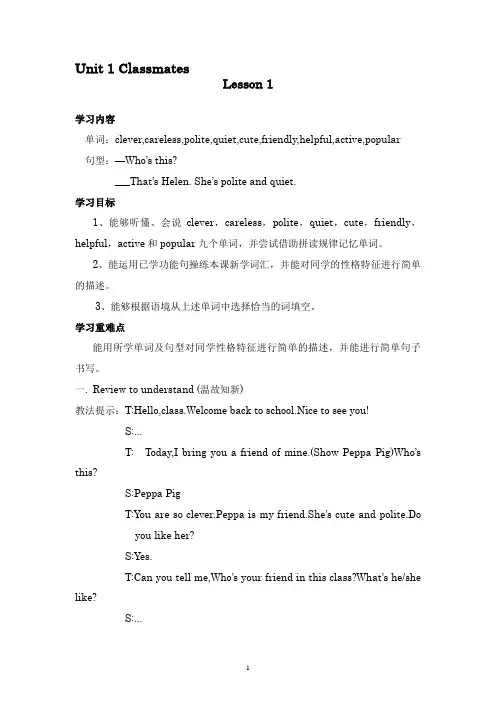
Unit 1 ClassmatesLesson 1学习内容单词:clever,careless,polite,quiet,cute,friendly,helpful,active,popular句型:—Who’s this?___That’s Helen. She’s polite and quiet.学习目标1、能够听懂、会说clever,careless,polite,quiet,cute,friendly,helpful,active和popular九个单词,并尝试借助拼读规律记忆单词。
2、能运用已学功能句操练本课新学词汇,并能对同学的性格特征进行简单的描述。
3、能够根据语境从上述单词中选择恰当的词填空。
学习重难点能用所学单词及句型对同学性格特征进行简单的描述,并能进行简单句子书写。
一.Review to understand (温故知新)教法提示:T:Hello,class.Welcome back to school.Nice to see you!S:...T: Today,I bring you a friend of mine.(Show Peppa Pig)Who’s this?S:Peppa PigT:You are so clever.Peppa is my friend.She’s cute and polite.Doyou like her?S:Yes.T:Can you tell me,Who’s your friend in this class?What’s he/she like?S:...T:Good.Bill has some new friends.Let ’s meet his them on page 2. 选出与图片相符合的单词,并填入图片下方的表格内。
对同伴做出评价(((二. Warm —up (热身活动)教法提示:PPT shows some characters.Teacher describes one of them,Ss guess who ’s this?T: This is a girl.She is thin.She has long hair and big eyes.She wears a blue T-shirt. S:She is ...T:You are so clever. Now it ’s your turn.Work in groups and describe one of them.Let ’s guess together. S:...(小组合作讨论) 看图补全句子。

1(三)学习活动三:★There be句型此句型特点是:后面的名词是句子的主语,属倒装结构。
如:There are some sharks. There与be中间可插入一些表推测的情态动词、表时态的短语和一些动词短语 (如和将来时be going to\ will、现在完成时 have\has + pp. ;used to结构等连用,如:There must be a pen in the box.There happened to be some money in my pocket.There is going to be a meeting tonight.因此,一般疑问句形式是将be或will/have/can/must等助动词、情态动词提至there 之前,如:Excuse me. Is there a repair shop near here for MP3?There be 句型的否定句有两种构成方式,一种是将否定副词not放be之后,如:There isn’t a box in the room.另一种是在主语前加上不定代词no , 如:There is no box in the room.使用此句型要注意:▲There be 句型中的be 应和其后出现的主语在数上一致,即“就近原则”。
如:There are five books, two pens and a ruler in the school bag.There is a ruler, two pens and five books in the school bag.▲如果主语是复数名词,却表示一笔金额或一个总数或表达一个单个概念时,则仍用单数be形式,如:There is five hundred dollars to pay.There is still another 20 miles to drive.▲There be 中的be 有时可以是lie, stand, used to be, seem to be, appear to be 等,如:There lies a river to the south.There lived an old man in the small house.There stood a temple near the river.There used to be a castle at the foot of the hill.▲和have的比较1.区别点:there be 意为存在,强调某地有某物,不表示所属关系;have 表示所有关系,强调某人或某地有某物,这是其基本用法。
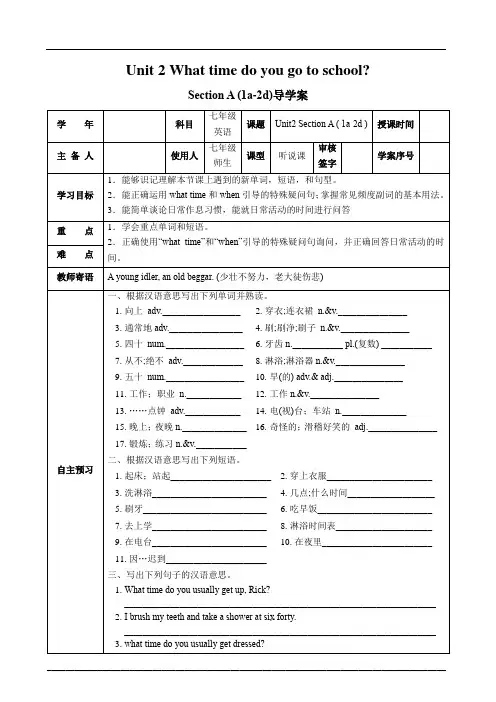
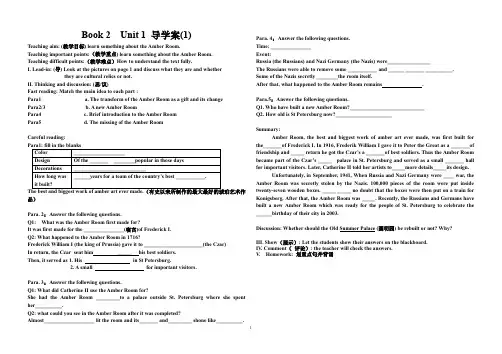
Book 2 Unit 1 导学案(1)Teaching aim: (教学目标) learn something about the Amber Room.Teaching important points:(教学重点) learn something about the Amber Room.Teaching difficult points:(教学难点)How to understand the text fully.I. Lead-in: (导) Look at the pictures on page 1 and discuss what they are and whetherthey are cultural relics or not.II. Thinking and discussion: (思/议)Fast reading: Match the main idea to each part :Para1 a. The transform of the Amber Room as a gift and its changePara2/3 b. A new Amber RoomPara4 c. Brief introduction to the Amber RoomPara5 d. The missing of the Amber RoomCareful reading:品)Para. 2:Answer the following questions.Q1: What was the Amber Room first made for?It was first made for the _______________(寝宫)of Frederick I.Q2: What happened to the Amber Room in 1716?Frederick William I (the king of Prussia) gave it to ______________________(the Czar)In return, the Czar sent him _____ his best soldiers.Then, it served as 1. His in St Petersburg.2. A small for important visitors.Para. 3:Answer the following questions.Q1: What did Catherine II use the Amber Room for?She had the Amber Room _________to a palace outside St. Petersburg where she spent her__________.Q2: what could you see in the Amber Room after it was completed?Almost___________________ lit the room and its_______ and_________ shone like__________.Para. 4:Answer the following questions.Time: _______________Event:Russia (the Russians) and Nazi Germany (the Nazis) were________________The Russians were able to remove some ___________ and ______ _______ __________.Some of the Nazis secretly ________the room itself.After that, what happened to the Amber Room remains .Para.5:Answer the following questions.Q1. Who have built a new Amber Room?____________________________Q2. How old is St Petersburg now?_____________________Summary:Amber Room, the best and biggest work of amber art ever made, was first built for the_______of Frederick I. In 1916, Frederik William I gave it to Peter the Great as a _______of friendship and _____ return he got the Czar’s a _______of best soldiers. Thus the Amber Room became part of the Czar’s _____ palace in St. Petersburg and served as a small _______ hall for important visitors. Later, Catherine II told her artists to_____more details_____its design.Unfortunately, in September, 1941, When Russia and Nazi Germany were ____ war, the Amber Room was secretly stolen by the Nazis. 100,000 pieces of the room were put inside twenty-seven wooden boxes. _____ _____ no doubt that the boxes were then put on a train for Konigsberg. After that, the Amber Room was _____. Recently, the Russians and Germans have built a new Amber Room which was ready for the people of St. Petersburg to celebrate the ______birthday of their city in 2003.Discussion: Whether should the Old Summer Palace (圆明园) be rebuilt or not? Why?III. Show(展示): Let the students show their answers on the blackboard.IV. Comment(评论): the teacher will check the answers.V. Homework: 划重点句并背诵1。
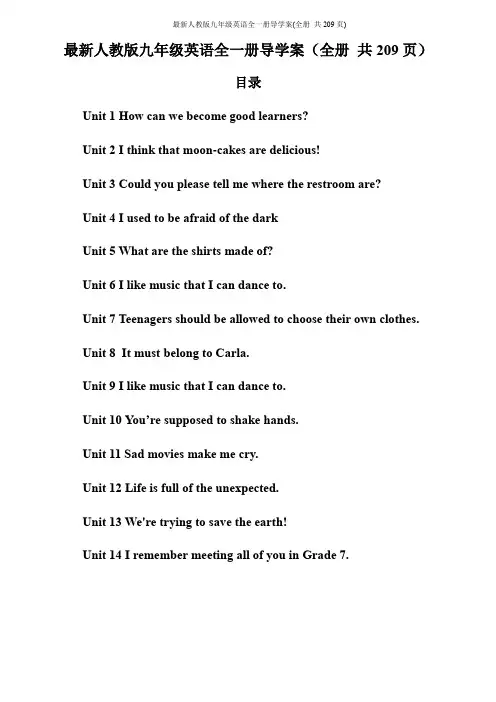
最新人教版九年级英语全一册导学案(全册共209页)目录Unit 1 How can we become good learners?Unit 2 I think that moon-cakes are delicious!Unit 3 Could you please tell me where the restroom are?Unit 4 I used to be afraid of the darkUnit 5 What are the shirts made of?Unit 6 I like music that I can dance to.Unit 7 Teenagers should be allowed to choose their own clothes.Unit8It must belong to Carla.Unit 9 I like music that I can dance to.Unit10You’re supposed to shake hands.Unit 11 Sad movies make me cry.Unit 12 Life is full of the unexpected.Unit 13 We're trying to save the earth!Unit 14 I remember meeting all of you in Grade 7.Unit 1 How can we become good learners?to be patient4. Try to guess a word’s meaning by reading the sentences before and after it.sentence n.Please use this word to make a sentence. make a sentence 五、练评(包含“考点链接” 应用探究 6分钟) 单项选择。
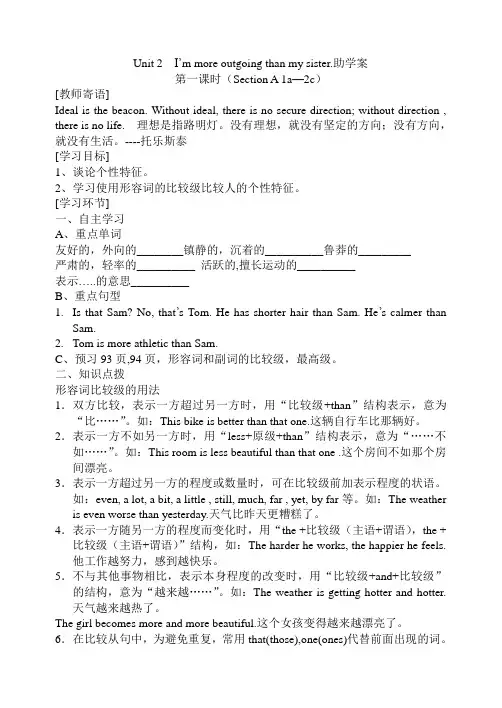
Unit 2 I’m more outgoing than my sister.助学案第一课时(Section A 1a—2c)[教师寄语]Ideal is the beacon. Without ideal, there is no secure direction; without direction , there is no life. 理想是指路明灯。
没有理想,就没有坚定的方向;没有方向,就没有生活。
----托乐斯泰[学习目标]1、谈论个性特征。
2、学习使用形容词的比较级比较人的个性特征。
[学习环节]一、自主学习A、重点单词友好的,外向的________镇静的,沉着的__________鲁莽的_________严肃的,轻率的__________ 活跃的,擅长运动的__________表示…..的意思__________B、重点句型1.Is that Sam? No, that’s Tom. He has shorter hair than Sam. He’s calmer thanSam.2.Tom is more athletic than Sam.C、预习93页,94页,形容词和副词的比较级,最高级。
二、知识点拨形容词比较级的用法1.双方比较,表示一方超过另一方时,用“比较级+than”结构表示,意为“比……”。
如:This bike is better than that one.这辆自行车比那辆好。
2.表示一方不如另一方时,用“less+原级+than”结构表示,意为“……不如……”。
如:This room is less beautiful than that one .这个房间不如那个房间漂亮。
3.表示一方超过另一方的程度或数量时,可在比较级前加表示程度的状语。
如:even, a lot, a bit, a little , still, much, far , yet, by far等。
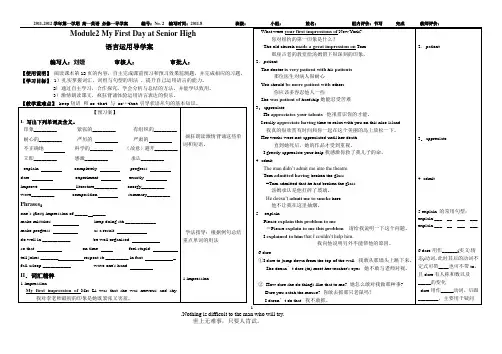
.Nothing is difficult to the man who will try.世上无难事,只要人肯试。
1 Module2 My First Day at Senior High语言运用导学案编写人:刘婕 审核人: 审批人:【使用说明】 阅读课本第12页的内容,自主完成课前预习和预习效果监测题,并完成相应的习题。
【学习目标】 1)扎实掌握词汇,词组与句型的用法 ,提升自己运用语言的能力。
2) 通过自主学习,合作探究,学会分析与总结的方法,并能学以致用。
3)激情朗读课文,疯狂背诵体验运用语言表达的快乐。
【教学重难点】 keep 短语 和so that 与 so…t hat 引导状语从句的基本知识。
【预习案】I. 写出下列单词及含义。
印象_________ 紧张的_________ 有组织的_________ 耐心的_________ 严厉的 严肃的不正确地 科学的_________ (故意)避开_________立即_________ 感激_________ 承认_________ explain completely progress dare experiment exactly improve literature_________ energy_________ wave_________ composition summary_________Phrases :one ’s (first) impression of _____ _____make mistakes keep doing sth ____________ make progress as a result do well in ___________ be well organisedso that on time feel stupid tell jokes _______ respect sb _________ in fact _fall asleep ___________ wave one's handII .词汇精粹 1.impression My first impression of Mrs Li was that she was nervous and shy. 我对李老师最初的印象是她既紧张又害羞。
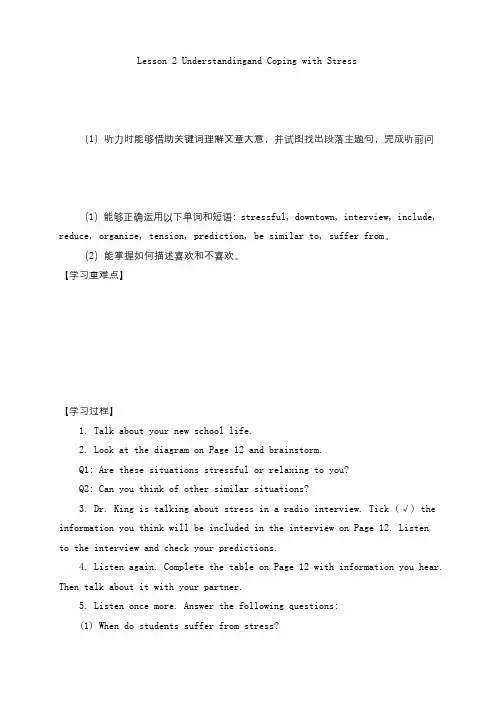
Lesson 2 Understandingand Coping with Stress(1)听力时能够借助关键词理解文章大意,并试图找出段落主题句,完成听前问(1)能够正确运用以下单词和短语: stressful, downtown, interview, include, reduce, organize, tension, prediction, be similar to, suffer from。
(2)能掌握如何描述喜欢和不喜欢。
【学习重难点】【学习过程】1. Talk about your new school life.2. Look at the diagram on Page 12 and brainstorm.Q1: Are these situations stressful or relaxing to you?Q2: Can you think of other similar situations?3. Dr. King is talking about stress in a radio interview. Tick (√) the information you think will be included in the interview on Page 12. Listento the interview and check your predictions.4. Listen again. Complete the table on Page 12 with information you hear. Then talk about it with your partner.5. Listen once more. Answer the following questions:(1) When do students suffer from stress?(2) What situations can be difficult for shy people?What is a good way to organize your work or study?6. Practice(1)根据要求写出对应英文和词性或中文意思。
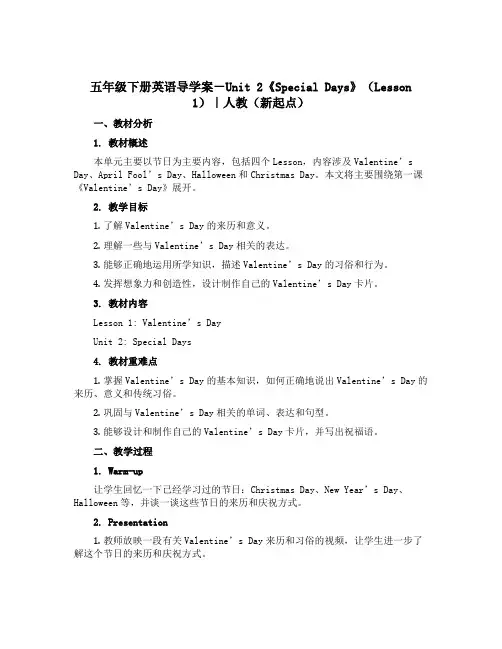
五年级下册英语导学案-Unit 2《Special Days》(Lesson1)|人教(新起点)一、教材分析1. 教材概述本单元主要以节日为主要内容,包括四个Lesson,内容涉及Valentine’s Day、April Fool’s Day、Halloween和Christmas Day。
本文将主要围绕第一课《Valentine’s Day》展开。
2. 教学目标1.了解Valentine’s Day的来历和意义。
2.理解一些与Valentine’s Day相关的表达。
3.能够正确地运用所学知识,描述Valentine’s Day的习俗和行为。
4.发挥想象力和创造性,设计制作自己的Valentine’s Day卡片。
3. 教材内容Lesson 1: Valentine’s DayUnit 2: Special Days4. 教材重难点1.掌握Valentine’s Day的基本知识,如何正确地说出Valentine’s Day的来历、意义和传统习俗。
2.巩固与Valentine’s Day相关的单词、表达和句型。
3.能够设计和制作自己的Valentine’s Day卡片,并写出祝福语。
二、教学过程1. Warm-up让学生回忆一下已经学习过的节日:Christmas Day、New Year’s Day、Halloween等,并谈一谈这些节日的来历和庆祝方式。
2. Presentation1.教师放映一段有关Valentine’s Day来历和习俗的视频,让学生进一步了解这个节日的来历和庆祝方式。
2.引导学生回忆已学习过的英文歌曲或儿歌,找出其中的一些关于Valentine’s Day的歌曲,一起来唱唱跳跳。
3. Practice1.学生分组,自由发挥,想象一下在Valentine’s Day当天,自己将会送给谁一个华丽而美丽的Valentine’s Day卡片,卡片上写下自己的祝福语。
2.学生可以利用色纸、画笔等制作一个卡片,并写下自己的祝福语。
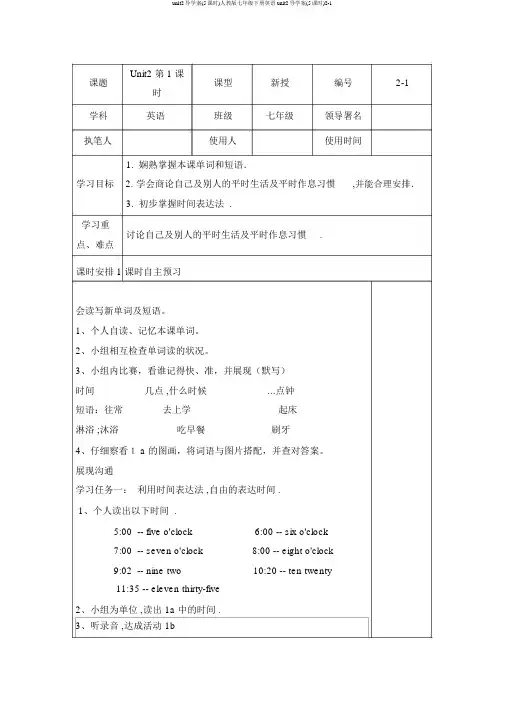
课题Unit2 第 1 课课型新授编号2-1时学科英语班级七年级领导署名执笔人使用人使用时间1.娴熟掌握本课单词和短语.学习目标 2. 学会商论自己及别人的平时生活及平时作息习惯,并能合理安排.3.初步掌握时间表达法 .学习重讨论自己及别人的平时生活及平时作息习惯.点、难点课时安排 1 课时自主预习会读写新单词及短语。
1、个人自读、记忆本课单词。
2、小组相互检查单词读的状况。
3、小组内比赛,看谁记得快、准,并展现(默写)时间 _________几点 ,什么时候 ___________...点钟 ______________短语:往常 _______去上学 ________________起床 _______________淋浴 ;沐浴 __________ 吃早餐 ____________刷牙 ______________4、仔细察看1 a 的图画,将词语与图片搭配,并查对答案。
展现沟通学习任务一:利用时间表达法 ,自由的表达时间 .1、个人读出以下时间 .5:00-- five o'clock6:00 -- six o'clock7:00-- seven o'clock8:00 -- eight o'clock9:02-- nine two10:20 -- ten twenty11:35 -- eleven thirty-five2、小组为单位 ,读出 1a 中的时间 .3、听录音 ,达成活动 1b学任二:达成 1c.运用句型 What time Rick 的平时生活及Rick 一家的淋浴 .1、熟 1a 中的 , 理解并复述 .2、两人合作 ,Rick 的平时生活 (分饰演 Rick 和采者 ).3、熟1b 中的 ,理解并复述.4、小位,两人合作 ,Rick一家的淋浴.知研究I usually get up at five o’ clock.1)句中usually 与often一都是度副,常用于be之后,行以前。
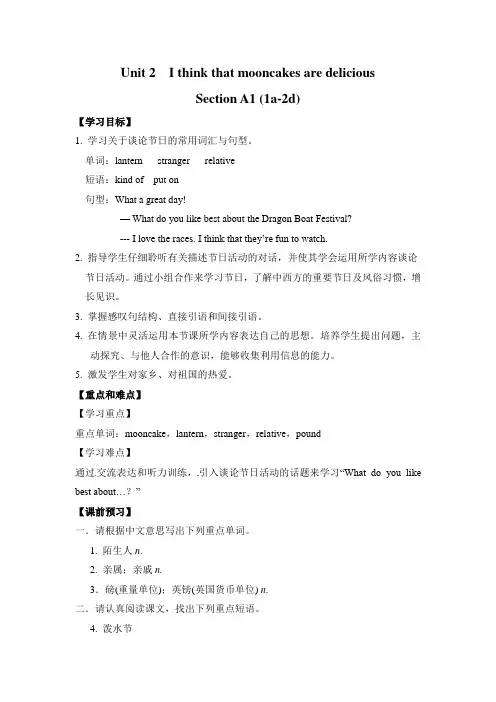
Unit 2 I think that mooncakes are deliciousSection A1 (1a-2d)【学习目标】1. 学习关于谈论节日的常用词汇与句型。
单词:lantern stranger relative短语:kind of put on句型:What a great day!— What do you like best about the Dragon Boat Festival?--- I love the race s. I think that they’re fun to watch.2. 指导学生仔细聆听有关描述节日活动的对话,并使其学会运用所学内容谈论节日活动。
通过小组合作来学习节日,了解中西方的重要节日及风俗习惯,增长见识。
3. 掌握感叹句结构、直接引语和间接引语。
4. 在情景中灵活运用本节课所学内容表达自己的思想。
培养学生提出问题,主动探究、与他人合作的意识,能够收集利用信息的能力。
5. 激发学生对家乡、对祖国的热爱。
【重点和难点】【学习重点】重点单词:mooncake,lantern,stranger,relative,pound【学习难点】通过交流表达和听力训练,引入谈论节日活动的话题来学习“What do you like best about…?”【课前预习】一.请根据中文意思写出下列重点单词。
1. 陌生人n. __________2. 亲属;亲戚n.__________3.磅(重量单位);英镑(英国货币单位) n. _______二.请认真阅读课文,找出下列重点短语。
4. 泼水节_______________5.端午节_______________6.中国春节_______________7.元宵节_______________8.外出吃饭_______________9.增加(体重);发胖_______________10.相互泼水_______________11.冲掉;冲走_______________三.请用以上重点短语完成下列句子。
Unit 2I feel nervous when I speak Chinese.课型:读写课◎知识导航请预习下列重点单词、短语和句子,并完成下面的表格及相关训练(标•的为重点单词拓展内容)。
单词和短语重点单词名词1.[用复数]眼镜glasses•(短语)一副眼镜a pair of glasses2.[用复数]牛仔裤jeans•(短语)一条牛仔裤a pair of jeans3.陌生人stranger•(adj.)陌生的;奇怪的strange4.电子邮件;口信;信息message•(近义词)电子信件email5.业余爱好hobby•(近义词) 兴趣interest6.分数mark•(近义词)得分score成绩grade7.(用于信尾)爱你的……love•(v.)喜欢;热爱love形容词8.情绪不安的;紧张的nervous•(反义词)放松的relaxed9.(头发)金色的,浅褐色的fair10.秀丽的;标致的pretty•(adv.)相当地•(近义词)美丽的;漂亮的beautiful11.感到自豪的;感到骄傲的proud•为……而感到骄傲be proud of介词12.参加;加入;在……期间;用,按照,以(某方式或风格) in•(短语)在寒假期间in winter holiday•(短语)用这种方式in this way重点短语1.因……而感谢thanks for ...2.收到某人的来信hear from sb.3.某人等不及了sb. can't wait4.从……认出某人know sb.from …5.看起来很美look pretty6.彼此each other7.告诉某人某事tell sb. about sth.8.在学校;上学at school9.花费……做某事spend ...doing sth.10.也as well11.擅长be good at12.得低分get bad marks13.首先,起初at first14.几天之后in a few days15.感到紧张feel nervous16.用正确的方式in the right way17.害怕……be afraid of ...18.对……兴奋be excited about ...学以致用根据语境或提示,完成填空。
Book1 Unit 2 Further Reading 教案1.学生活动Get intersted in thistopic and thinkabout thesequestions设计意图引入话题,激发学生兴趣,为下面的阅读做铺垫。
时间安排3’Step 2While-reading 1.Skim the text tofind out the mainidea and thewriting style ofthis passage2.Ask students tomatch the mainideas withparagraphs3.Ask students toread the passageparagragh byparagraph and1.Read the passagequickly to get themain idea andfigure out thewriting style2.Find out themain idea foreach paragraph3.Read the textparagraph byparagraph forsome detailedinformation .1.让学生学会skimming来获取文章体裁和主旨大意,培养学生快速获取信息的阅读能力。
2. 让学生归纳出每段的段落大意,让学生对文章的整体框架和脉络更为清晰3. 通过问答、填表格等活动让学生20ʹfind out moredetailedinformation.4.Help the studentsto guess themeaning of someimportantexpressions fromthe context and dosome exercises onthem. 4.Learn themeaning ofsome new wordsand expressionsfrom the contextor wordformation.5.Do someexercises toconsolidate whatthey havelearned.进一步阅读寻找文章中的一些细节信息、加深对文章的理解。
苏教版八年级英语下册导学案(1-2单元)8B Unit 1 Past and Present第1课时Comic strip and Welcome to the unit班级____________________ 姓名__________________ 自我评价__________________【学习目标】1. 知识目标:识记北京不同时代的交通工具。
2. 技能目标:通过观察时间表并排列信息,了解现在完成时这一语法概念。
3. 情感目标:通过交通方式的变化,了解并体会北京的巨大变化。
学习过程【预习指导与检测】一、预习指导1.本课开始学习现在完成时(助动词have + 动词的过去分词),它包含三种情况,即:(1)过去的动作对现在的影响;(2)过去开始的并一直延续到现在的动作或状态;(3)过去开始的并一直延续到现在而且还要延续下去的动作。
现在先预学第一种情况。
现在完成时表示过去的动作对现在的影响,发生在过去的某动作已经结束,但此动作对现在产生了某种影响或结果,现在完成时正是强调这种影响或结果而不强调过去的动作。
如:(1) I have seen the film before.(强调:I know something about the film.)(2) He’ s gone to Beijing.(强调:He isn’t here. Perhaps he’s on the way or he’s in Beijing now.)(3) I have already finished my homework.(强调:I’m free now or I can do sth. else.)2.亮出你的聪明才智,下面现在完成时的句子强调什么?(1) We’ve just cleaned the classroom.(强调:)(2) I’ve never seen the man before.(强调:)(3) They haven’t had lunch yet.(强调:)此种语法的现在完成时句中常有already, yet, just, before, ever, never等词,你能通过查阅资料或向其他同学请教来了解它们的用法吗?二、预习检测(一)翻译下列词组。
教学目标:1. 知识目标:(1) 能够正确听、说、读、写单词 "often, sometimes, rarely" 和词汇 "go swimming, play soccer, visit family, go shopping";(2) 能够正确运用一般现在时描述自己和他人的日常生活。
2. 能力目标:(1) 能够运用所学生日用品类单词和一般现在时进行日常交流;(2) 能够通过图片、情景、人物等线索,正确运用一般现在时描述自己和他人的日常生活。
3. 情感目标:(1) 培养学生的合作意识,学会与人分享;(2) 培养学生热爱生活,积极向上的生活态度。
教学内容:1. 课题:Unit 2 My week (Part A let's learn & let's spell)2. 课题内容:学习词汇 "go swimming, play soccer, visit family, go shopping",单词 "often, sometimes, rarely",以及一般现在时。
教学重点与难点:1. 重点:(1) 掌握单词 "often, sometimes, rarely" 和词汇 "go swimming, play soccer, visit family, go shopping";(2) 运用一般现在时描述自己和他人的日常生活。
2. 难点:(1) 一般现在时的运用;(2) 词汇 "often, sometimes, rarely" 在实际语境中的运用。
教具与学具准备:1. 教具:PPT、单词卡片、图片、情景剧道具等;2. 学具:课本、练习本、文具、小组合作学习资料等。
教学过程:Step 1: 热身(5分钟)1. 师生问候,进行简单的英语对话;2. 复习上一单元的词汇和句型;3. 导入本课话题:谈论日常活动。
必修1 导学案Unit 2 English around the worldClass:____________ No: _____ Group:____________ Name:______________ Part 1 Words and Expressions, Warming Up& Comprehension of Reading 1【使用说明与学法指导】1.预习案:I. 练读词汇表、听录音跟读。
II. 完成练习。
2.探究案:堂上使用,熟读熟记。
3.练习案:堂上使用或课后作业,熟读熟记。
【学习目标】1.熟读掌握本单元词汇表,并记住适当的拓展词汇。
2.对本单元的主题进行热身, 口语训练。
3.掌握Warming Up 部分语言点的运用。
4.阅读Reading 1,掌握文章的结构,并进行细节的理解,培养阅读理解能力。
【预习案】【训练案】(Words and Expressions, Warming Up)一、单词拼写题7.In this school, more than one person(不止一个人)masters English.二、单句语法填空:1. The government official gave an official statement that the officer would be put into prison. (office)2. Mr. Li, who speaks English fluently, says that fluency develops gradually over time and practice. (fluent)3. His facial expressions suggest that he’s quite satisfied with the result and he always expresses things in this way. (express)4. He called himself Chris but his actual name is John. Actually he has never met Chris. (actual)5. The group of monkeys from the east are heading back eastward(s).(east)6. The best way of learning a foreign language is to speak to the native speakers and of course treat the natives friendly. (native)7. The Spanish are the people who come from Spain and speak Spanish. (Spanish)8. Southerners are people living in the south which is the southern part of a country.Part 2 Language Points in Reading 1【使用说明与学法指导】1.预习部分:I. 精读课文,划出Task 1中的词汇、句型及语法结构,并填空。
II. 记下自己的疑问,以备堂上讨论,释疑。
2.探究部分:堂上完成。
3.练习部分:堂上或课后完成。
【学习目标】1.熟读掌握Reading 1中出现的语言点,温故知新。
2.重点掌握Reading 1语言点重难点的运用。
【预习案】Task 1【探究案】Task 1 Key words and expressions in Reading 1.1.Do you know that there is more than one kind of English? 你知道有不止一种英语吗?拓展:more than one+单数名词,意为“不止一个……”,在语意上虽为复数,但作主语时,谓语动词用单数。
(1) More than one student was late for class this morning.今天早晨不止一个学生迟到了。
(2)We are more than glad to help you.我们非常乐意帮助你。
2.It was based more on German than the English we speak at present.拓展:base vt. 以……为基础/根据n. 底部;基础base sth/upon 把…以…为基础/根据be based on/ upon以…为基础A be based on B=base A onB (某事物)以……为基础/根据即学即练:1)You should base your conclusion on careful research.2) The TV play, which is based on a detective novel , is very popular with young people.3) 我们的意见应该以事实为依据。
We should base our opinions on facts.Our opinions should be based on facts.3.I'd like to come up to your apartment.我乐意去你的公寓。
拓展:come up走近;上来;提出;发芽,长出;升起;被提及;出现come about 发生(常与how连用) come across 偶然遇到come out 开花;出版;发表;罢工come true 实现come up with 提出come to 共计,总计;(总数)达到即学即练:(1)The sky was dark blue when the moon came up.(2)He has just finished writing his book and it will come out next month.(3)We are going to the cinema.Will you come along?(4)The total cost that they had spent on their clothes this month came to nearly 2,000 yuan.(5)I can't come up with any more ideas right now.I’ve just come across a beautiful poem in this book.ter in the next century, people from England made voyages to conquer other parts of the world and because of that, English began to be spoken in many other countries.拓展:because of 因为;由于because of是短语介词,后接名词、代词、动名词或what引导的名词性从句;because是连词,后接从句。
即学即练:1)We had to walk home because of missing the bus.由于错过了公车,我们不得不步行回家。
2)因下大雨,他没来上学。
He was absent from school because it rained heavily/because of the heavy rain.5.English is also spoken in Singapore and Malaysia and countries in Africa such as South Africa. 拓展:such as例如……;像……;诸如【比较】such as是短语介词,只能放在名词前,可举其中几个例子。
for example是副词词组,可放句首、句中或句末,其前后常有标点,一般只列举同类中的一两个例子,以解释你的意思或支撑某个观点。
例子可以是一个名词、一个句子、一件事、一个故事等。
即学即练:1)I visited several big cities such as New York,Chicago,and Boston.我参观过几个大城市,例如纽约、芝加哥和波士顿。
2)用such as或for example填空。
⑴I like drinks such as tea and coffee.⑵Many countries, for example, Mexico and Japan, have a lot of earthquakes.6.So by the 1600’s Shakespeare was able to make use of a wider vocabulary than ever before.拓展:make use of 利用;使用make good/full/little use of 好好/充分/不充分利用即学即练:(1))You ought to make good use of any opportunity to practice English.你应该充分利用好一切机会来练习英语。
(2)Ten minutes has been made full use of to study the problem.充分利用10分钟的时间来研究这个问题。
7.For example,India has a very large number of fluent English speakers because Britain ruled India from 1765 to 1947.比如,由于英国在1765至1947年间统治着印度,所以印度有很大一部分人会讲一口流利的英语。
拓展:a number of“许多,大量的”,和复数名词连用。
当它出现在主语前时,谓语动词用复数形式。
还可以在number 前加上形容词great,large,small等表示程度。
the number of “……的数量”,修饰可数名词,谓语动词用单数形式。
(1) A number of students are crazy about computer games.许多学生对电脑游戏很痴迷。
(2) A number of professors are present today;the number of them is 600.许多教授今天都在场,他们的数量有600人。